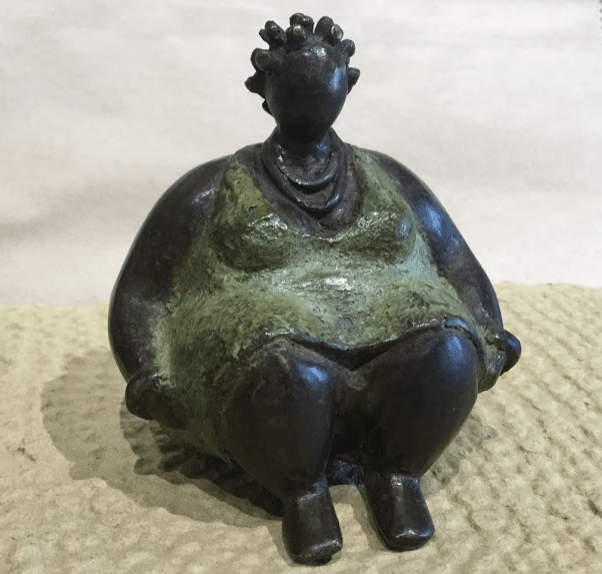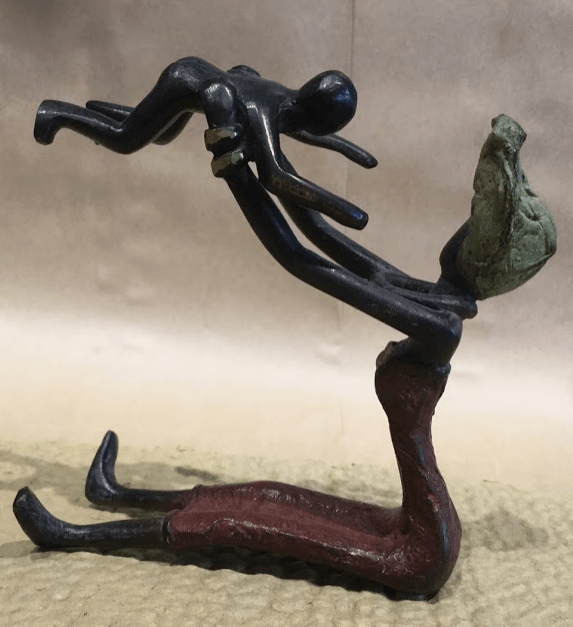Seeing how other cultures think can be quite helpful for understanding the Bible. Dieting and weight gain are particularly interesting topics to explore.
Consider the surprising experience some friends of mine had on a short-term missions trip to Uganda. They were invited to visit a local prayer group where women were standing up and sharing their testimonies.
One lady told about her life of woe, recounting her many struggles with crop failure, ill health and money problems. The Lord had answered her prayers, though, one by one. At the culmination of her speech, she patted her rounded belly as her voice triumphantly proclaimed,
“…and God has made me fat!”
You can imagine the chuckling among my friends who were visiting. We can hardly imagine celebrating our expanding waistlines. But in Africa, being fat is a sign of health and prosperity, because hunger is a common problem.
A Proper Double Chin
Believe it or not, people in the biblical world had the same attitude—that a little extra weight was a positive, not a negative thing. The beautiful woman of Song of Songs was complemented for her ample belly:
Your navel is a rounded goblet that never lacks blended wine. Your waist is a mound of wheat encircled by lilies. (Song of Songs 7:2).
Likewise Proverbs 13:4 says,
The soul of the sluggard craves and gets nothing,
But the soul of the diligent is made fat.
This positive attitude might seem surprising until you realize that the common struggle in the ancient world was against hunger, not flab.
 Jewish culture has retained some of this attitude. In Yiddish it used to be a compliment to say that a woman was zaftig, meaning “plump.” The word literally means “juicy” — because her voluptuous curves were like a luscious, ripe fruit ready to be plucked. (Of course, nowadays zaftig is just a euphemism for “overweight.”)
Jewish culture has retained some of this attitude. In Yiddish it used to be a compliment to say that a woman was zaftig, meaning “plump.” The word literally means “juicy” — because her voluptuous curves were like a luscious, ripe fruit ready to be plucked. (Of course, nowadays zaftig is just a euphemism for “overweight.”)
And, remember how in Fiddler on the Roof, Tevya sung about how he longed to be a rich man so that his wife Golde could have “a proper double chin.”
You even see this attitude in advertisements from a few decades ago, when products were marketed to help women put on weight and avoid looking skinny and gaunt.
Scouring the Bible for Weight Loss Tips
Nevertheless, dozens of dieting books have scoured the Bible for weight loss secrets.* A favorite source of inspiration is the first chapter in Daniel. He and his friends eat a diet of vegetables instead of the royal banquet table, so he’s celebrated as an example of victorious dieting.
 But did you know that the biblical text literally says that he actually became “fatter in flesh than all the youths who ate the king’s food”? (Daniel 1:15, ESV)
But did you know that the biblical text literally says that he actually became “fatter in flesh than all the youths who ate the king’s food”? (Daniel 1:15, ESV)
Some translations render this as “healthier,” but the Hebrew word here is bari, which is also used to describe Eli’s sons who ate sacrifices before the suet was removed (1 Sam. 2:29) and the king of Eglon who sported an overflowing potbelly (Judges 3:17-22).
Indeed, the same Hebrew word was associated both with weight gain and with healthiness (as in labriut, “to your health”) precisely because the two ideas were once so closely associated with each other.
What can we learn?
Obviously, we don’t need to take this as a biblical command to eat excessively. Many of us would be healthier if we slimmed down.
What’s important is to be reminded that our culture’s interest in weight loss isn’t universal. Much of the world does not have the food resources that we do, and for much of history people didn’t either. We’ve been blessed with abundant resources, and it’s hard for us not to overeat.
To read the Bible authentically, we need to keep in mind where our culture is at, relative to the Bible and relative to the rest of the world.
~~~~~
* For more, see my article, “Why the Daniel Plan Might Make You Fat.”
More on this theme of “repacking your mental bags” because of differences between our culture and the biblical world can be found in my upcoming book, Reading the Bible with Rabbi Jesus.
~~~
Credit: The sculptures above were created by artisans in Burkina Faso and were on display at The Bridge, a store in downtown Holland, Michigan that sells work by artists in the developing world at fair trade prices.



Carla Gade says
That’s a fascinating perspective. I enjoy reading your insights.
Sheila Schippers says
Very interesting. This cultural awareness has helped so much. Also Inteesting because I am in a group addressing our health and habit issues using the Daniel Plan material.
Andrea says
I found your site while searching the web for the meaning of Matthew 13:32. Thank you for the reminder that our preoccupation with exta pounds isn’t universal. Your blog put a smile on my face. (The sculptures are beautiful).
Mrs. Trinda Rensen says
Hello
In searching to pray for my daughters “Ish”, I found you.
Please add me to your email list and a website where I might find other Hebraic understandings.
I am now praying for her…..”Bashert”…..
Do you have any insight?
Toda Raba
Trinda
Deborah Burdzy says
As I was reading this I got thinking (always kind of dangerous LOL), perhaps there is also something else going on here…these people are actually grateful for the bounty God provides for them. I think that if we had to go without food because we are poor, we might be less likely to worry about the waistlineD and be absolutely celebratory and thankful for the provision of God. I’m not advocating letting food be a god we run to, or that we become gluttons — just maybe that we be less concerned with what the world says we should look like and more focused on the provision and blessings of God (if this makes sense???).
Celia A Gattereau says
Beautiful story very well written!
Billie James Chapman says
For Daniel and his friends the diet was in their obedience to God. I get off track when I start focusing on my appearance instead of my relationship with God. I always get so much out of your writing, Thank You
Carol Dawson says
Thank you for these interesting insights! In my family of four girls, we wore sizes 6, 8 10, and 12. I was never too happy that I am the size 12 amongst my slender sisters. But now I will just consider it a blessing! 😊 I am Marcia Johnson’s sister, so you can figure out if she is the 6, 8, or 10. 🤓